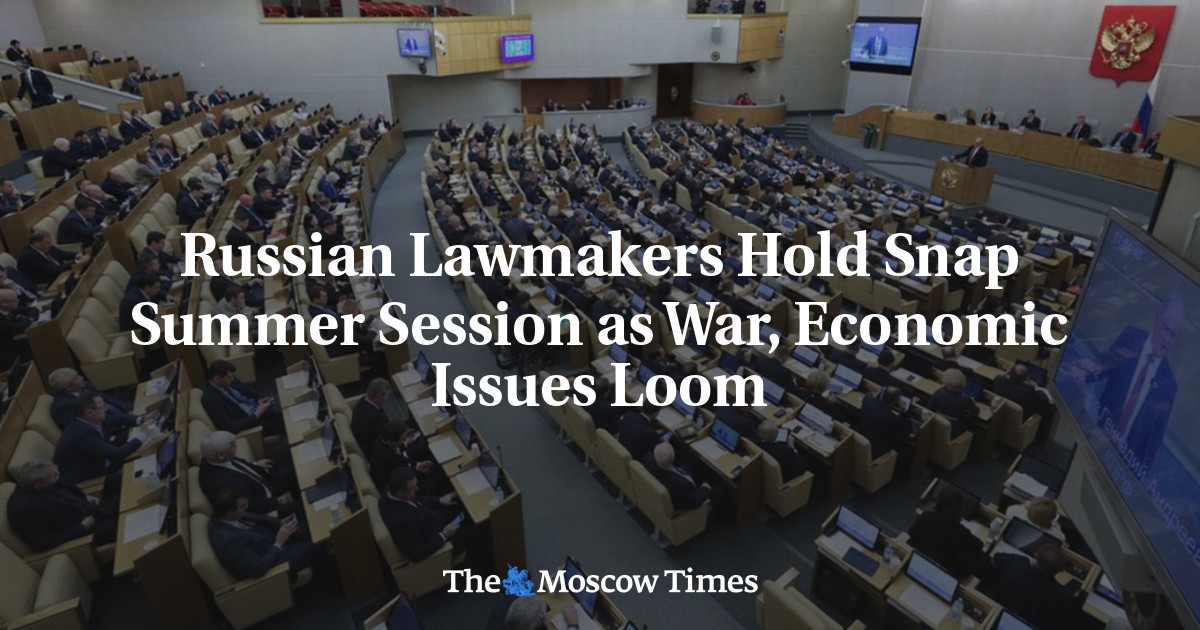
Russia’s lower house of parliament will gather for an “extraordinary” meeting Friday amid speculation that deputies could sign off on a major policy announcement or government reshuffle.
The meeting comes as Russia faces mounting domestic and foreign policy problems, from the dragging war in Ukraine to the economic fallout of sanctions.
But the suddenness of the decision to recall parliament less than a week after the State Duma’s spring session ended indicates that an urgent matter is at hand, analysts and lawmakers told The Moscow Times.
More than 60 issues are expected to appear on Friday’s agenda — including measures to support Russia’s citizens, military personnel and economy — and “the task is to consider them as soon as possible,” State Duma Speaker Vyacheslav Volodin said.
Several lawmakers told The Moscow Times that the main reason for the session is a government reshuffle, with deputies expected to vote on confirming Industry and Trade Minister Denis Manturov to the post of Deputy Prime Minister.
Manturov, 53, was officially nominated for the position Wednesday after President Vladimir Putin signed a decree increasing the number of deputy prime ministers to 11.
Konstantin Zatulin, a prominent deputy with the ruling, pro-Kremlin United Russia party, told The Moscow Times that Manturov’s nomination is “important” as “there’s a huge need for mobilization decisions in the industrial sector.”
Independent political analyst Abbas Gallyamov said Putin himself likely requested the session with the sole goal of confirming Manturov.
“The session is probably just the personal will of Putin, who decided it would be more effective to revive Russia’s industrial capacity with Manturov as deputy prime minister,” said Gallyamov, a former speechwriter for the Russian president. “Putin behaves like a tsar and there’s nothing extraordinary in gathering 450 deputies for him.”
Foreign policy matters are also likely to appear high on the agenda as the Kremlin continues to pursue its military offensive in Ukraine and eyes retaliations to sweeping Western sanctions imposed over the war.
“It is not ruled out that we will see a political decision that may be related to the situation in Ukraine,” said Gallyamov.
Such extraordinary sessions have in the past been used to make foreign policy decisions, said political scientist Yekaterina Schulmann.
In 2014, the State Duma gathered for an extraordinary meeting to ratify Crimea’s “admission” into Russia following the Ukrainian peninsula’s controversial referendum to join the country. And lawmakers returned from summer vacation in 2008 to vote in favor of recognizing Georgia’s breakaway regions of Abkhazia and South Ossetia.
Friday’s meeting could also seek a response to European Union sanctions that have halted rail shipments between mainland Russia and its exclave of Kaliningrad, which is sandwiched between Lithuania and Poland.
“Several [international] issues have appeared after the end of the plenary session, including the worsening situation on the delivery of goods to Kaliningrad,” Alexei Chepa, a member of the State Duma’s Foreign Affairs Committee, told The Moscow Times.
“Important topics are on the agenda,” he added, without elaborating further.
A wide variety of sometimes-contradictory information about the possible agenda has been reported by Russian media in recent days.
The Kommersant business daily reported Sunday, citing a source in the State Duma, that the issues discussed at the plenary session wouldn’t be connected to the war in Ukraine.
The independent Meduza news website reported Tuesday, citing sources, that the resignations of Prime Minister Mikhail Mishustin and Digital Development, Communications and Mass Media Minister Maksut Shadayev could be on the agenda.
The RBC business daily said Tuesday, citing sources, that Deputy Prime Minister Yuri Borisov, who oversees the space and defense industries, could leave his post — a report subsequently denied by Sergei Mironov, head of the A Just Russia party.
State Duma deputies who spoke to The Moscow Times said the agenda “is still taking shape” and will be finalized on Friday before the session begins.
“The State Duma doesn’t cover permission to use troops abroad [or declare] martial law and state of emergency,” Schulmann told The Moscow Times.
If the agenda is limited to government reshuffles and legislation, Schulmann said, “it looks a bit humiliating for the Duma – they finished [the spring session], summed up the results and it turns out they haven’t considered the most important issues.”
“It looks like they have to finish their homework.”